 |
| May 4, 1883 |
April 30,1717 - Town agrees to buy land for burying ground
May 6,1872 - Charles River approved for town water supply
May 4, 1883 - First bicycle ride up Corey Hill
May 1, 2007 - Women form majority of Select Board for first time
April 30,1717
Town agrees to buy land for burying ground
A committee appointed by Town Meeting agreed to buy, for eight pounds, a half acre of land on Walnut Street from Samuel Clark Jr. to be used as a burying ground. The land was near the newly formed meeting house of the town's first church, now known as First Parish, which was formed that year.
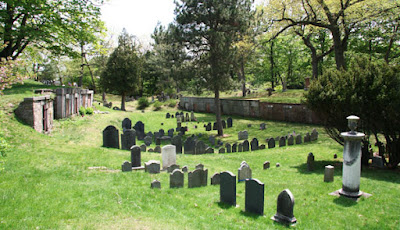 |
| The Old Burying Ground on Walnut Street |
Clark was given the right of herbage, or the use of grass cut from the property for hay, in exchange for maintaining a fence along the front of the cemetery. The original part of the burying ground holds the remains of members of many early Brookline families. It was expanded in 1840 with purchase of an additional three quarters of an acre from a descendant of Clark.
The Old Burying Ground also holds the remains of a number of enslaved men and women. A stone honoring their memory was installed in the outside wall of the cemetery in 2009.
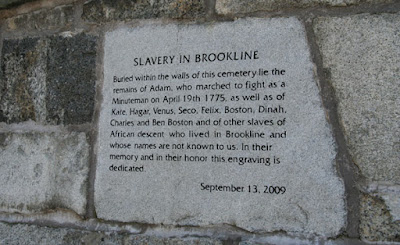 |
| 2009 stone in memory of enslaved men and women who were interred in the Old Burying Ground |
May 6, 1872
Charles River approved for town water supply
Town Meeting accepted an act of the state legislature authorizing Brookline to take water from the Charles River for the town's first municipal water supply. The town had pushed for the legislation after being rebuffed by the City of Boston for access to its water supply, despite the fact that part of Boston's water system -- the Boylston Street Reservoir -- was located in Brookline.
Brookline had considered other sources for its water, including Massapoag Pond in Dunstable, before settling on the Charles River. A pumping station was built on the shore of the river in West Roxbury, in an area known as Cow Island,
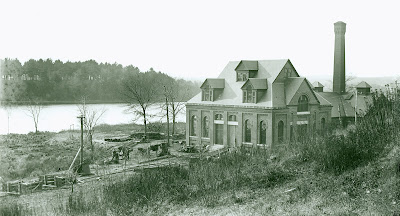 |
| Cow Island pumping station on the Charles River under construction in the 1870s (Brookline Preservation Department) |
Water ran through a filtration system before being pumped to an open town reservoir on Fisher Hill (later replaced by a covered reservoir). It continued to be used until being phased out after Brookline joined the Metropolitan District.
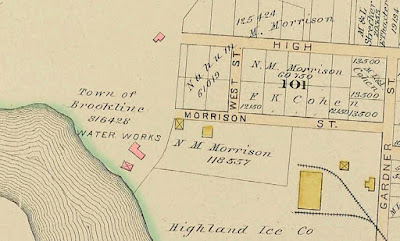 |
| Part of an 1884 atlas showing the Brookline waterworks along the Charles River in West Roxbury |
May 4, 1883
First bicycle ride up Corey Hill
One of the high points in metropolitan Boston-- literally and figuratively -- for bicyclists in the 1880s was Corey Hill in Brookline. Wheelmen strove to become the first to make it to the top of the hill and, after that barrier was broken in 1883, to set a new record time or simply challenge themselves to conquer the steep incline. (See the image at the top of this post.)
"The hill is one of the steepest and longest in the vicinity of Boston," wrote the Boston Globe on July 29, 1883, shortly after the first successful ascent "and hundreds of wheelmen have unsuccessfully tried to ride up."
H.D. Corey (fittingly enough) became the first to make the climb on a bicycle, a Rudge Light Roadster. Corey was a noted Boston wheelman. (The following year he would become one of the first to ride a bicycle down Mt. Washington, the highest peak in New England.)
 |
| This 1884 advertisement in the Yale Literary Magazine described the Rudge Light Roadster as "The only Bicycle that has ever been ridden up Corey Hill." |
May 1, 2007
Women form majority of Select Board for first time
It took 40 years after women won the right to vote before the first woman was elected to Brookline's governing body (then known as the Board of Selectmen) in 1960. It would take another 47 years before the board --still called the Board of Selectmen -- had a female majority for the first time.
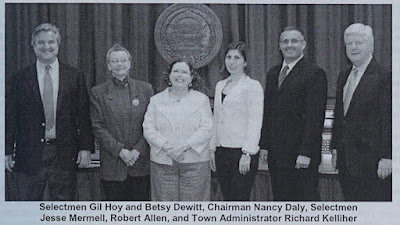 |
| Brookline's Board of Selectmen as shown with the Town Administrator in the town's 2007 Annual Report |
Jesse Mermell, who had finished third in a five-person race for two seats in 2006, easily topped a male opponent for the one seat open in 2007. She thus joined Betsy DeWitt, the top vote-getter in 2006, and Nancy Daly, elected in 2005, on the board.
The elections of the three women marked a quick turnaround for Brookline. Daly's election two years earlier ended 15 years of male-only representation on the board. The name of the governing body would not be changed from Board of Selectmen to Select Board until 2017.
No comments:
Post a Comment